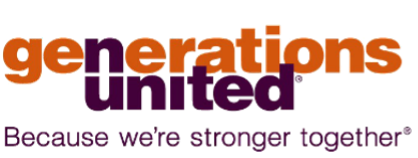Resource Guide for Kinship/Grandfamily Providers
The 2022 National Strategy to Support Family Caregivers provides a roadmap for organizations and agencies to better support kin/grandfamily caregivers and the children they raise.
Kin caregivers, also called grandfamily caregivers, are grandparents, other relatives, or close family friends raising children as a result of parental death, substance use, military deployment, incarceration, or other issues. The families they form are interchangeably known as kinship families, grandfamilies, and kinship/grandfamilies.
While many of these caregivers do not see themselves in the names “kinship” or “grandfamilies,” they are doing the important job of raising children when parents cannot. We all likely know such a family because these parental issues touch every socioeconomic level, race, ethnicity, and geographic area in the country. At least 2.4 million children are being raised in these families across the United States.
Many challenges faced by kinship/grandfamilies can be similar to those faced by parent-headed families, but there are two fundamental differences between these families. Unlike parents, who have automatic legal rights and responsibilities for their children, kin/grandfamily caregivers do not. Moreover, they did not plan or expect to raise these children. They often step up to raise children at a moment’s notice – sometimes in the middle of the night – and usually due to a family crisis. Despite these challenges, decades of research prove that there are many benefits to these children being raised by kin, rather than by caregivers who do not know them, their culture, or their roots.
To help you support these families, acknowledge their strengths, and address their challenges, this guide contains links to an array of resources for you as a service provider. In many cases, you can share the resources with the caregivers themselves.
Resources to Increase Public Awareness About Kinship/Grandfamilies
- Learn what a kinship/grandfamily is via this one-minute video
- Explore the strengths and challenges of kinship/grandfamilies
- Access the decades of research showing that children thrive in kinship/ grandfamilies
- Find national, tribal, and state-specific data about kinship/grandfamilies
Resources for Engaging and Partnering with Kinship/Grandfamilies
- Get tips on finding kinship/grandfamilies so they can access program services
- Access a kin-finding toolkit and related webinar for child welfare providers
- Find racial equity toolkits to improve engagement and support for African American, Latino, and American Indian/Alaska Native grandfamilies
- Get tips on involving kinship/grandfamilies in programmatic decision-making
Resources for Finding and/or Providing Supportive Services for Kinship/Grandfamilies
- Find kinship/grandfamily supportive services in each state, D.C., Puerto Rico, the U.S. Virgin Islands, and three tribes
- Access examples of state-specific kinship/grandfamily resource guides
- Find kinship navigators programs around the country
- Learn how the child welfare system supports kinship/grandfamilies
- Learn how the Aging Network supports kinship/grandfamilies
- Get information about legal options for kinship/grandfamilies
- Learn how to support caregivers with long-term planning
- Get tips on supporting educational access for kinship/grandfamilies
- Access self-care and mental health tip sheets to share with kinship/grandfamilies
Resources for Supporting Kinship/Grandfamily Financial and Food Security
- Watch a webinar on public benefits available to support kinship/grandfamilies, and complete a fillable PowerPoint template for your area and deliver training to staff and caregivers
- Note: The webinar also covers legal options for kin/grandfamily caregivers
- Explore state-specific information on adoption/guardianship for children exiting foster care with kin (also helpful to those without child welfare involvement)
- Learn about nutrition resources for kinship/grandfamilies and access fact sheets explaining how the Supplemental Nutrition Assistance Program; school breakfast and lunch programs; and the Special Supplemental Nutrition Program for Women, Infants, and Children can help kinship/ grandfamilies
- Get guidance on financial planning and employment leave options for caregivers
Resources for Building Evidence to Support Kinship/Grandfamilies
- Watch a webinar on strategies for kinship programs seeking to build evidence of their success and access related additional resources
- Learn how to leverage the National Youth Risk Behavior Survey to find out more about children in kinship families
- Find evidence-based kinship programs and services via the U.S. Administration for Children and Families Title IV-E Prevention Services Clearinghouse
- Note: The Clearinghouse also catalogs other evidence-based programs and services beyond those that support kinship/grandfamilies
The Grandfamilies & Kinship Support Network: A National Technical Assistance Center (Network) helps government agencies and nonprofits in states, tribes, and territories work across jurisdictional and systemic boundaries to improve supports and services for families in which grandparents, other relatives, or close family friends are raising children whose parents are unable to do so. For more information, please visit www.GKSNetwork.org.
Acknowledgement
Learn More
To learn more about the National Strategy to Support Family Caregivers and find more resources, visit the the National Academy for State Health Policy’s RAISE Act Family Caregiver Resource and Dissemination Center.






